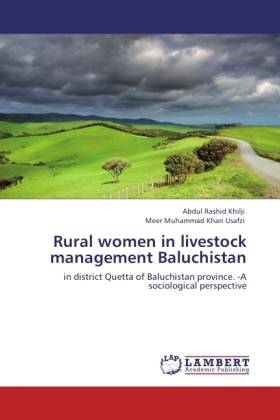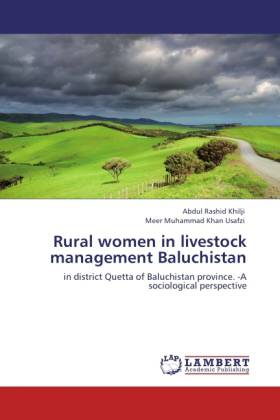
- Afhalen na 1 uur in een winkel met voorraad
- Gratis thuislevering in België vanaf € 30
- Ruim aanbod met 7 miljoen producten
- Afhalen na 1 uur in een winkel met voorraad
- Gratis thuislevering in België vanaf € 30
- Ruim aanbod met 7 miljoen producten
Zoeken
Rural Women in Livestock Management Baluchistan
in district Quetta of Baluchistan province. -A sociological perspective
Abdul Rashid Khilji, Meer Muhammad Khan Usafzi
Paperback | Engels
€ 48,45
+ 96 punten
Omschrijving
In order to know the perceptions on the role played by the women in management of livestock in district Quetta a study was conducted by interviewing 100 women from 10 selected villages, 10 women from each village of the study area covering all age groups. The results showed that 47% of the women were of 41-50 years age, and few were even more than 50 years, 61% were illiterate, only one each of 100 were matriculated and intermediate. Generally, the condition of rural Balochistan is not good, no awareness and sense of importance of female education and hence deteriorating situation in regards to female health also. Women in rural Balochistan are substantially involved in the management of livestock. There were 90 cows, 16 buffalos, 305 sheep, 556 goats, 3 horses, 9 donkeys, 4 camels and 1450 poultry birds existed at the homes belonged to the respondent women; and 63 % of the women under study were totally responsible to manage their livestock at their homes, while 37 % were partially involved in livestock management activities.
Specificaties
Betrokkenen
- Auteur(s):
- Uitgeverij:
Inhoud
- Aantal bladzijden:
- 84
- Taal:
- Engels
Eigenschappen
- Productcode (EAN):
- 9783846529072
- Verschijningsdatum:
- 12/10/2011
- Uitvoering:
- Paperback
- Formaat:
- Trade paperback (VS)
- Afmetingen:
- 152 mm x 229 mm
- Gewicht:
- 136 g

Alleen bij Standaard Boekhandel
+ 96 punten op je klantenkaart van Standaard Boekhandel
Beoordelingen
We publiceren alleen reviews die voldoen aan de voorwaarden voor reviews. Bekijk onze voorwaarden voor reviews.











